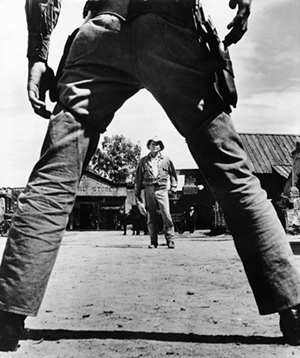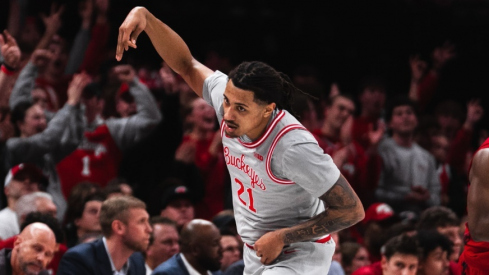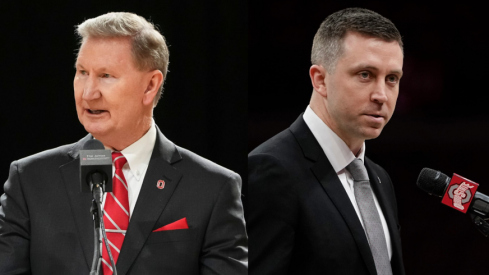 BCS Executive Director Bill Hancock
BCS Executive Director Bill Hancock
Unless you’ve been living in a cave or you think Twitter is a Cajun dish, you’ve undoubtedly heard the big news by now: the BCS will recommend a four-team playoff to presidents of NCAA FBS universities.
Eleven conference commissioners met this week in Hollywood, Fla. along with Notre Dame Athletic Director Jack Swarbrick – who inexplicably they continue to let sit at the grown-ups’ table – to discuss the future of the Bowl Championship Series. After days of deliberations, the 12 angry men have confirmed they’ll endorse 2-3 different scenarios to be voted on in July.
This has the feel of an alternate (preferred) ending of a movie released 20 years ago.
In January of 1992, after two consecutive years finishing with split national champions, a bunch of men got together and decided the solution was blatantly obvious. They’d take the top two teams that the members of the esteemed media picked for them subjectively, provided those teams didn’t play in the Big Ten or Pac-10 (as they didn’t want to share their bowl with others) and if the media or coaches wanted, they could vote the winner of the game as the national champion.
D’oh! Why didn’t we think of that sooner?
If you listen to unflappable BCS Executive Director (Baghdad) Bob Bill Hancock, it’s because it was groundbreaking. In a 2009 U.S. News and World Report diary, Hancock defended the BCS for its revolutionary contributions to college football.
“Before the formation of the BCS, the Associated Press's No. 1 and No. 2 teams met in bowl games only eight times in 56 seasons,” he began. “In contrast, since the conferences created the BCS 12 years ago, the top two teams have played every year if you use the BCS measurements and nine times if you go by the AP poll. The BCS is the best format ever devised to match up the nation's top two teams in a bowl game.”
So what he’s saying, with a straight face, is that they created a subjective formula to determine the top two teams, and the system was able to match its top two teams against one another every season without fail according to the formula they used. That’s groundbreaking stuff, really.
I wish there was a warranty for stupidity.
Even in my hormonal, pubescent years, I figured the system for the sham that it was. Now after several variations and adaptations that led us to the BCS as we know it, I want the 20 post-adolescent years of my life back.
When I ponder this news for more than two seconds, without regurgitating, I feel like Jim Carrey in Dumb and Dumber: “we’ve landed on the moon!”
For the past 20 years, college football has been running in place. While professional football popularity has skyrocketed and has arguably become America’s pastime, college football has evolved into the national past-due. This solution of a four-team playoff, or “event” as the BCS cloaks were calling it earlier in the week, is the Kelly’s Blue Book version of trading in a Chevy Bel Air for a Corsica. Give me the freakin’ DeLorean instead.
Calling Marty McFly. Played by Michael J. Fox, McFly was the teenager in the 1985 science-fiction adventure, Back to the Future, that used the DeLorean to travel back in time by 30 years. By mistake, he causes his mother to fall for him and must undo the damage by playing Cupid with her and his future father’s hearts. In this case, I wish we could make certain the parents had never met.
That it took two decades to come up with this antiquated solution is a slam on American ingenuity. In his diary, Hancock used the ‘slippery slope’ argument as one of many to describe playoffs as untenable.
 Mike Slive and Jim Delany should settle differences old-school
Mike Slive and Jim Delany should settle differences old-school“Wherever a line is drawn, the teams on the outside looking in will inevitably start clamoring to enlarge the playoffs,” Hancock noted. “That's exactly what has happened with the NCAA men's basketball tournament, which has grown from eight teams to 65 teams and now is under pressure to expand to 96.”
Of course, Hancock misses the point that there were less than 100 major college basketball teams when the NCAA Tournament began in 1939, and there are now almost 350. The same ratio applied to FBS would yield us a 22-team tournament (FCS now uses 20) so calling for an eight or 16-team format is hardly opening up Pandora’s Box.
Even if it were, forget slippery slopes: give me the whole treacherous mountain.
Officially, the BCS has ruled out any formats above four teams. That means beginning in 2014 we’ll have to enjoy the addition of power windows to our new Corsica. Perhaps in another decade we’ll catch up with technology.
For now, we must savor this as one small step for man and a giant leap for BCS-kind. Like BCS officials, we value the regular season. But how meaningful has the regular season been for Boise State (twice), Utah (twice), Auburn and TCU who all ran up undefeated seasons with no BCS title game appearance to show for it? Remember, it’s also the same system that gave Alabama a rematch with LSU after losing at home during the regular season in a game that made Wisconsin basketball look sexy.
But hey, now we’re just preaching to the choir. Most people already wanted a playoff long ago. BCS…meet moon.
There remain many obstacles before the final details are hashed. Will the four teams be conference champions exclusively or picked at-large? Will those selections be by computer, by poll or by selection committee? Will the games be played on January 1 with the championship a week later, or will it begin a week earlier? Heavyweights Jim Delany and Mike Slive have been engaging in an Old Western saloon showdown in public over whether to play the national semifinals on-campus or as part of the BCS bowl lineup.
This week, Florida AD Jeremy Foley noted the “logistics” issues with playing semifinal games on-campus. He added there’s, “too much at stake.”
One must call into question Foley’s motivation. His school hasn’t played an out-of-state, non-conference game since 1991. Jim Boeheim would be proud. Ironically, that game was against Syracuse.
In fact, in the last 193 games played over 15 seasons for Florida, only 62 have been played outside of the sunshine state. Among those, 58 of them were mandated by the SEC with the other four being bowl games. Only four of their last 15 bowls have been played outside of Florida (New Orleans twice, Atlanta and Phoenix). So when Foley hedges on the idea of playing a game north of the Mason-Dixon, one has to question his real motivation. It seems Florida is perfectly happy living their priviledged existance close to home.
The battle of Slive and Delany is being won by the SEC statesman…for now. Reports from outlets far and wide have the leader in the clubhouse being a system where the semifinals would be played among rotating BCS bowls with the championship being bid out to various cities.
It’s ironic how this is the leading option. In fact, in Hancock’s 2009 public relations (read: propaganda) tour, his rhetoric directly combats this.
“Second, playoffs burden the fans,” Hancock wrote in a separate USA Today diary. “It's unrealistic to ask thousands of college students and fans to travel to faraway places week after week, to follow their teams through a playoff.”
Yet, Hancock, in response to why now after all these years they’re finally going to a playoff, said, “they’re listening to the fans.”
If that were true, there would be more than four teams; some games would be played at home sites; and you’d be out of a job.
That we’re going to wind up seeing these games played as part of the BCS bowls is unsurprising. In fact, if you’ve read Dan Wetzel’s Death to the BCS book, this just further illustrates the bowl cartel is running the show. They couldn’t defeat public opinion any longer, so the solution was to simply increase the importance of the bowls altogether.
Whether Delany wins the battle over format supremacy or Slive wins, they all win. While the SEC is hoping the system stays in their favor, it’s rigged in favor of all of them. And that’s why we’re 20 years behind the curve and we’ll be running in circles for 20 more.
We can debate the specifics until we're blue in the face. There are merits for both selecting four teams at-large and using only conference champions. One gives us a better chance at the four best teams, while the other is merit-based, would eliminate some of the subjectivity and would create a prima facie playoff during all conference games. Bonus points: the latter would also screw Notre Dame. And whether they play semifinal games on-campus or on a neutral field is a matter of preference.
Unfortunately, these arguments are largely superficial and only reinforce the fallacy of why it's taken us this long to get here.
It’s so sad that we’re willing to accept mediocrity in a system. A four-team playoff is certainly better than the finger-painting they've been passing off as artwork for two decades, but I feel like a Cubs’ fan thrilled for 81 wins. We should still be outraged that it took us so long to get a “step in the right direction.” That’s a long time for a freakin’ step. This news should be happening in 1992 and not 2012. Instead, we got the Bowl Coalition and all the self-adulation by BCS execs for thinking they’re so clever for instituting it.
Paging Dr. Brown: bring us your DeLorean. We have a love interest to destroy.

